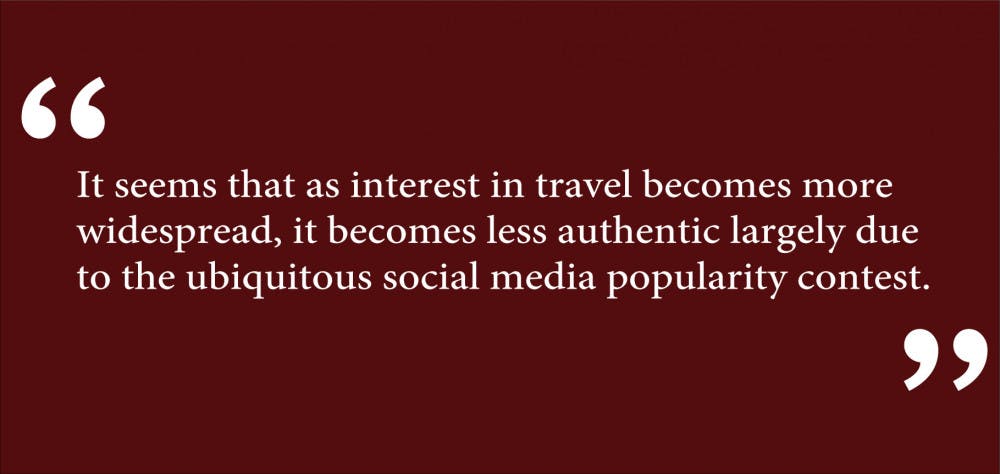It seems as if everyone is into traveling these days. Let me rephrase that: Millennials are into traveling. In 2016, 80 percent of millennials surveyed by the American Society of Travel Agents reported taking a leisure vacation that year. And it’s not just the statistics — my Instagram tells me the same thing. I can pretty much count on seeing photos of a friend’s travel experience every time I open the phone app. This happens so often that I can even tell you which experiences are in vogue at the moment — trips to Block Island, on-a-whim vacations to Yosemite National Park and, if you’re lucky and can afford it, elephant-back excursions in Thailand, among others. But as traveling increases in popularity, our reasons for traveling are becoming increasingly insincere.
There are obvious reasons for the current travel boom — notably technology, which has made traveling significantly cheaper and easier in recent years. With the advent of Airbnb, the scope of accommodations has expanded to include not only hotels and hostels, but also local apartments. Meanwhile, airfares fell by about 50 percent between 1979 and 2011. More abstractly, the Great Recession has evaporated any trust that millennials previously maintained in the value of job loyalty and the idea of saving for retirement. Many of us see travel largely as a way to take a break from an unpredictable job market (or internship market, in the case of Brown students) in the hope of finding inspiration in unfamiliar settings, should we be so lucky to afford travel in the first place.
But there are also more self-serving reasons for travel — namely our desire to publicize it. This is another manifestation of a desperate rat-race to appear cultured and attractive; it seems that everyone on Tinder advertises their love of traveling. If you traveled somewhere but didn’t take photos, did you even go? For most intents and purposes, the answer is no. It seems that in travel, bragging rights are the only thing that matters. Usually I can’t tell whether my friends travel because they want to or because they feel that they are supposed to. As with food, I would argue that travel is a medium through which young people enjoy bougie displays of one-upmanship via photography. But when I’m looking at my Instagram feed, I feel as if I am being compelled by the trying-too-hard filters and captions to see these photos as some sort of genuine self-expression. I have a hard time buying this. It seems that as interest in travel becomes more widespread, it becomes less authentic largely due to the ubiquitous social media popularity contest.
And I’m not just saying this: The Instagram trend is already having tangible effects on tourism economies across the world. For example, a town in New Zealand invited and hired Instagram influencers — “social media trendsetters with large followings” — in 2015 and experienced a 14 percent increase in tourism within a year. I have a hard time believing that these newfound visitors really cared about visiting Wanaka, New Zealand in the first place; they simply wanted to appear trendy. It seems that if a destination shows up on your “Explore” feed on Instagram, it will automatically show up in your Expedia itinerary.
Though these superficial reasons for travel seem benign, they matter. Our motives are what ultimately separate meaningful travel from potentially exploitative tourism — and yes, there is a difference between the two. Just look at Puerto Rico, rendered economically incapable of dealing with the aftermath of two hurricanes. Yet I know many Brown students who traveled there last spring because airfares were cheap and the drinking age is 18. And then there is the extreme example of Cabo San Lucas, Mexico right now: Drug-related killings, administered by the Jalisco cartel, occur blocks away from beach-fronting, all-expenses-paid resorts and their upper-class denizens. The two worlds are separate and unequal, physically and financially. Both Puerto Rico and Cabo are examples of indifferent traveling to destinations with long-standing problems and no long-term solutions. Boycotting these locations isn’t necessarily an option — it could do more harm than good to local economies, and arguably both issues stem from government-mismanagement more so than from exploitative tourism — but it is worth keeping the consequences of our travel in mind.
Although travel has become an intractable part of my generation’s thinking — I would even go so far as to say that it represents the new American dream — what’s missing from this equation is any meaningful concern on the part of American visitors for their destination’s long-term well-being. This not only applies to international destinations, but also domestic ones, as Trump orders the Department of the Interior to “review all designations of national monuments greater than 100,000 acres created since 1996,” perhaps to make room for more energy-related endeavors. While the lack of current discussion about this review might be another example of the Trump administration’s ability to sweep policy changes under the rug, the public’s inattention to this particular issue also makes a statement about American attitudes toward the destinations we frequent.
I know that we can’t change the fact that millennial wanderlust is here to stay. But as we purchase Spring Break tickets and plan trips during the summer, we can change the way we view travel from a blithe consumption of the destination’s aesthetics (for Instagram) to a genuine engagement with its history, people and the current state of its political affairs. The travel trend is here to stay, but that doesn’t mean that we have to continue traveling indifferently and ignorantly.
Andrew Friedman ’19 can be reached at andrew_friedman@brown.edu. Please send responses to this opinion to letters@browndailyherald.com and other op-eds to opinions@browndailyherald.com.





